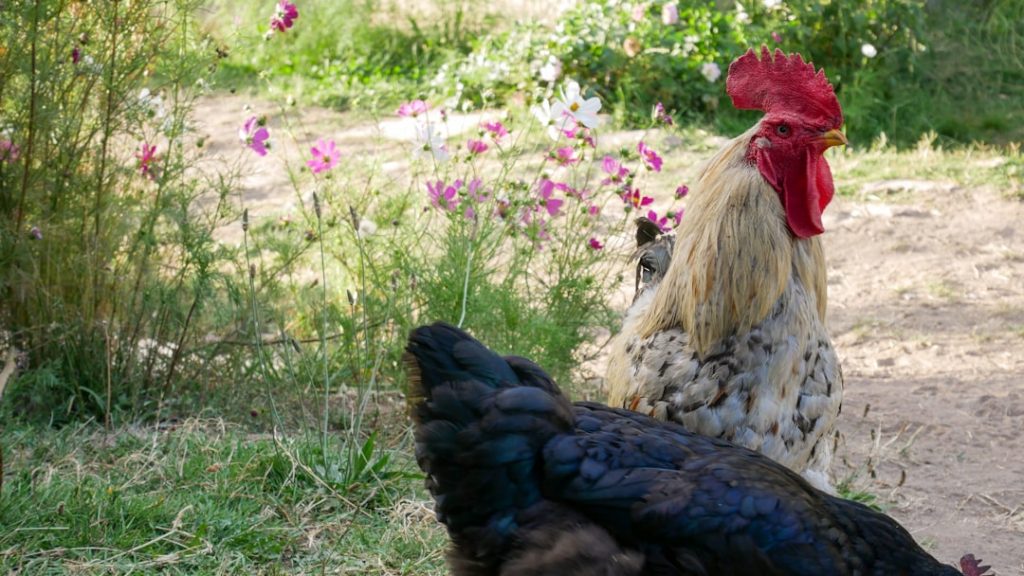Free-range chicken keeping is a method of raising chickens that allows them to roam freely outdoors, foraging for food and engaging in natural behaviors. This approach contrasts with conventional methods that confine chickens to small coops or runs. Free-range systems offer several advantages for chicken welfare, environmental sustainability, and egg quality.
Chickens raised in free-range environments have the opportunity to express natural behaviors such as scratching, pecking, and dust bathing. These activities contribute to their physical and mental well-being, potentially resulting in healthier birds. Free-range eggs are often perceived as having superior quality, with more flavorful and colorful yolks, attributed to the varied diet and increased exercise of the hens.
The popularity of free-range chicken keeping has increased in recent years, driven by consumer interest in food sourcing transparency and sustainable farming practices. This method can be adopted by both commercial farmers and backyard enthusiasts. However, successful free-range chicken keeping requires understanding and addressing specific challenges, including:
1.
Breed selection
2. Creating a safe outdoor environment
3. Training chickens to return to their coop
4.
Providing appropriate nutrition and healthcare
5. Protecting against predators and environmental hazards
6. Adapting free-range practices to urban settings
Implementing effective strategies in these areas is crucial for maintaining a healthy and productive free-range chicken flock.
Table of Contents
- 1 Selecting the Right Breeds for Free-Range
- 2 Creating a Safe Environment for Free-Range Chickens
- 3 Training Chickens to Stay in the Yard
- 4 Providing Proper Nutrition and Health Care for Free-Range Chickens
- 5 Dealing with Potential Predators and Hazards
- 6 Tips for Managing Free-Range Chickens in an Urban Setting
- 7 FAQs
- 7.1 What are the benefits of keeping backyard chickens with no fence?
- 7.2 How can I keep my backyard chickens safe without a fence?
- 7.3 What are the potential challenges of keeping backyard chickens with no fence?
- 7.4 What breeds of chickens are best for free-ranging without a fence?
- 7.5 Are there any legal considerations for keeping backyard chickens with no fence?
Key Takeaways
- Free-range chicken keeping allows chickens to roam and forage freely, resulting in healthier and happier birds.
- When selecting breeds for free-range, consider their foraging abilities, hardiness, and ability to avoid predators.
- Creating a safe environment for free-range chickens involves providing adequate shelter, secure fencing, and predator-proofing measures.
- Training chickens to stay in the yard can be achieved through positive reinforcement, such as providing treats and creating boundaries.
- Proper nutrition and health care for free-range chickens include a balanced diet, access to clean water, and regular health check-ups and vaccinations.
- Dealing with potential predators and hazards requires implementing predator-proofing measures, such as installing motion-activated lights and using guard animals.
- Tips for managing free-range chickens in an urban setting include checking local regulations, providing adequate space, and minimizing noise and odor disturbances for neighbors.
Selecting the Right Breeds for Free-Range
Key Characteristics of Suitable Breeds
When choosing breeds for free-range chicken keeping, it is essential to consider breeds that possess certain key characteristics. These include a friendly and docile temperament, good foraging skills, and the ability to thrive in outdoor environments.
Popular Breeds for Free-Range Chicken Keeping
Some popular breeds known for their suitability for free-ranging include Rhode Island Reds, Australorps, Orpingtons, and Sussex. These breeds are known for their friendly disposition, good foraging skills, and ability to thrive in outdoor environments.
Why These Breeds Excel in Free-Range Settings
Rhode Island Reds are a popular choice for free-range chicken keeping due to their hardy nature and excellent foraging abilities. Australorps are another excellent choice for free-ranging, as they are active foragers and have a calm and friendly demeanor. Orpingtons are known for their gentle nature and adaptability to outdoor environments, making them well-suited for free-range living. Sussex chickens are also well-regarded for their ability to thrive in free-range settings, as they are active foragers and have a calm and sociable temperament. By selecting breeds that are well-suited for free-ranging, you can ensure that your chickens will be happy, healthy, and productive in their outdoor environment.
Creating a Safe Environment for Free-Range Chickens

Creating a safe environment is essential for the well-being of free-range chickens. While allowing chickens to roam freely has numerous benefits, it also comes with potential risks such as predators, disease, and environmental hazards. To ensure the safety of your free-range chickens, it is important to take proactive measures to protect them from these potential threats.
One of the first steps in creating a safe environment for free-range chickens is to provide adequate fencing to keep predators out and chickens in. This can be achieved by using sturdy wire fencing that is buried at least a foot into the ground to prevent digging predators from gaining access to the coop area. In addition to fencing, it is important to provide adequate shelter and roosting areas for free-range chickens to protect them from the elements and potential predators.
A secure coop or hen house should be provided for the chickens to roost at night and lay their eggs. This coop should be predator-proof with latches and locks on doors and windows to prevent entry by raccoons, foxes, or other nocturnal predators. Providing ample space for the chickens to roam and forage is also essential for their well-being.
A spacious outdoor area with access to grass, insects, and vegetation will allow the chickens to engage in natural behaviors and lead a fulfilling life. By creating a safe environment with proper fencing, shelter, and space for foraging, you can ensure that your free-range chickens are protected from potential threats and can thrive in their outdoor environment.
Training Chickens to Stay in the Yard
Training chickens to stay in the yard is an important aspect of free-range chicken keeping, especially if you live in an area with neighbors or potential hazards such as roads or predators. While chickens have a natural instinct to roam and explore, it is possible to train them to stay within designated areas using positive reinforcement and deterrents. One effective method for training chickens to stay in the yard is to use treats as a reward for staying within the designated area.
By providing treats such as mealworms or scratch grains when the chickens remain within the yard, they will learn to associate staying close to home with a positive reward. Another effective strategy for training chickens to stay in the yard is to use visual or physical barriers to discourage them from wandering off. This can be achieved by using temporary fencing or netting to create boundaries around the yard or garden area where you want the chickens to stay.
By providing clear boundaries and using deterrents such as noise makers or motion-activated sprinklers near the perimeter of the yard, you can discourage chickens from venturing beyond the designated area. Consistency is key when training chickens to stay in the yard, so it is important to reinforce boundaries regularly and provide positive reinforcement when the chickens remain within the designated area. With patience and persistence, it is possible to train free-range chickens to stay close to home and minimize the risk of wandering off into potential danger.
Providing Proper Nutrition and Health Care for Free-Range Chickens
Proper nutrition and health care are essential aspects of free-range chicken keeping in order to ensure that your chickens remain healthy and productive. While free-ranging allows chickens to forage for much of their food, it is important to supplement their diet with high-quality feed that provides essential nutrients such as protein, vitamins, and minerals. A balanced diet is crucial for egg production, feather quality, and overall health of free-range chickens.
Additionally, access to clean water at all times is essential for maintaining hydration and supporting proper digestion. In addition to proper nutrition, regular health care is important for maintaining the well-being of free-range chickens. This includes regular health checks to monitor for signs of illness or injury, as well as providing necessary vaccinations and parasite control.
It is also important to keep the coop or hen house clean and well-ventilated to prevent the spread of disease and maintain a healthy living environment for the chickens. By providing proper nutrition and health care, you can ensure that your free-range chickens remain healthy, productive, and able to thrive in their outdoor environment.
Dealing with Potential Predators and Hazards

Identifying Potential Threats
Free-range chicken keeping comes with the challenge of dealing with potential predators and hazards that can pose a threat to the safety of your chickens. Common predators that may pose a threat to free-range chickens include foxes, raccoons, hawks, owls, dogs, and even domestic cats.
Secure Fencing and Shelter
To protect your chickens from these potential threats, it is important to take proactive measures such as installing secure fencing around the perimeter of the yard or coop area. This can help prevent access by ground-dwelling predators such as foxes or raccoons. In addition to fencing, it is important to provide adequate shelter and roosting areas for the chickens to protect them from aerial predators such as hawks or owls.
Visual Deterrents and Vigilance
Using visual deterrents such as scarecrows or reflective tape near the coop area can also help deter aerial predators from targeting your chickens. It is also important to be vigilant and observant of potential threats in your area, such as stray dogs or neighborhood cats that may pose a risk to your free-range chickens.
By taking proactive measures and being aware of potential predators and hazards in your area, you can help protect your free-range chickens from harm and create a safe environment for them to thrive.
Tips for Managing Free-Range Chickens in an Urban Setting
Managing free-range chickens in an urban setting presents unique challenges due to limited space, potential noise concerns from neighbors, and local ordinances or regulations regarding keeping poultry. However, with careful planning and consideration, it is possible to successfully raise free-range chickens in an urban environment while being considerate of neighbors and local regulations. One important consideration when managing free-range chickens in an urban setting is providing adequate space for them to roam while minimizing disruption to neighbors.
It is important to provide secure fencing around the yard or garden area where the chickens will be allowed to roam freely in order to prevent them from wandering into neighboring properties or onto public streets. Additionally, providing adequate shelter and roosting areas within the yard can help minimize noise concerns from early morning crowing or other vocalizations that may disturb neighbors. It is also important to be mindful of local regulations regarding keeping poultry in urban areas, such as restrictions on the number of chickens allowed or specific requirements for coop construction.
By being considerate of neighbors and adhering to local regulations, you can successfully manage free-range chickens in an urban setting while enjoying the benefits of fresh eggs and a more sustainable lifestyle. In conclusion, free-range chicken keeping offers numerous benefits for both the chickens and their caretakers by allowing them to engage in natural behaviors while producing high-quality eggs. By selecting suitable breeds, creating a safe environment, training chickens to stay in the yard, providing proper nutrition and health care, dealing with potential predators and hazards, and managing free-range chickens in an urban setting, you can create a fulfilling and sustainable lifestyle while raising happy and healthy chickens.
With careful planning and consideration of their specific needs, free-range chicken keeping can be a rewarding endeavor that allows you to connect with nature while enjoying fresh eggs from your own backyard flock.
If you’re interested in learning more about how to keep backyard chickens without a fence, you may want to check out this article on the Producers Pride Sentinel Chicken Coop from Poultry Wizard. This coop is designed to provide a safe and secure environment for your chickens, even without the use of a traditional fence. The article discusses the features of the coop and how it can help you keep your chickens safe and happy. (source)
FAQs
What are the benefits of keeping backyard chickens with no fence?
Keeping backyard chickens with no fence allows the chickens to roam freely and forage for insects and plants, which can improve the quality of their eggs and meat. It also allows for a more natural and spacious environment for the chickens to live in.
How can I keep my backyard chickens safe without a fence?
To keep backyard chickens safe without a fence, it’s important to supervise them while they are free-ranging, provide them with a secure coop for shelter at night, and use natural barriers such as shrubs or hedges to create boundaries for the chickens.
What are the potential challenges of keeping backyard chickens with no fence?
Some potential challenges of keeping backyard chickens with no fence include the risk of predators such as foxes, raccoons, and birds of prey, as well as the possibility of the chickens wandering onto neighboring properties.
What breeds of chickens are best for free-ranging without a fence?
Some breeds of chickens that are known for their ability to free-range without a fence include the Rhode Island Red, Plymouth Rock, and Sussex. These breeds are known for their foraging abilities and are generally more independent.
Are there any legal considerations for keeping backyard chickens with no fence?
It’s important to check local ordinances and regulations regarding keeping backyard chickens without a fence, as some areas may have specific requirements or restrictions for free-ranging chickens. It’s also important to be considerate of neighbors and ensure that the chickens do not cause any disturbances.
Meet Walter, the feathered-friend fanatic of Florida! Nestled in the sunshine state, Walter struts through life with his feathered companions, clucking his way to happiness. With a coop that’s fancier than a five-star hotel, he’s the Don Juan of the chicken world. When he’s not teaching his hens to do the cha-cha, you’ll find him in a heated debate with his prized rooster, Sir Clucks-a-Lot. Walter’s poultry passion is no yolk; he’s the sunny-side-up guy you never knew you needed in your flock of friends!







